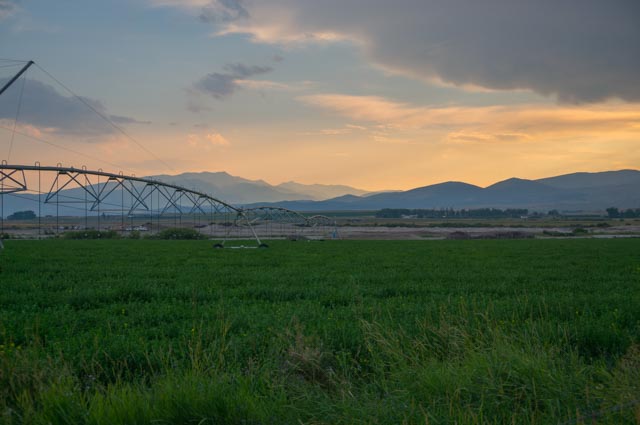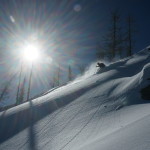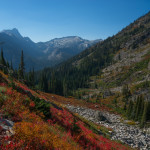Things Left Behind originally ran in Camas Magazine. You can find the beginning right here.
They stood on the porch and waited for the van that the boy in the yellow shirt had said would come. She had no car and so they waited on the porch. The boy asked, Momma can I feed the horses if we’re leaving? The horses were still in the pen and had not been moved even though up the canyon orangeblack embers rolled down the steep grassy slope and caught fire anew. Not now she said, there’s time for that when we come back.
She liked the horses, too. A boy she knew as a child had a palomino that they sometimes rode. He would bring it to the pole fence behind the school so that she could climb onto the timbers and reach over its back with her leg. It wore no saddle and she sat behind the boy, arms wrapped tightly around his bony waist. He held them on the horse with his bare heels tucked tightly around the cream and butterscotch ribs of the beast and her voice made a funny thumping sound with every canter step. Her hair sometimes would blow into her face and stick in her eyes and mouth, but she was afraid to let go of the boy to brush it away.
She wondered what happened to that boy and if he’d become a man or stayed a boy like the mottled, sad-eyed drinkers that stared too long when she went to town. The smoke was thicker now. It burned her eyes and she couldn’t see much past the green painted cattle guard just up the road. A warm wind blew across the porch and the low roar of the fire up the valley was woven in the breeze with the idling diesels of fire trucks and trembling aspen.
They waited forty minutes and the van still had not come. They played Eye Spy and Twenty Questions to pass the time so that the boy would not be scared. It seemed to the boy strange that he was told to hurry, but now they waited playing games. They were a child’s games and he was tired of them soon, but agreed to another to distract his mother so that she was not afraid. The wind came down the canyon like an open oven door. Wait here she said and moved the cast iron sprinkler to the other side of the roof.
Woodsmoke choked the canyon now and the sun, still high but late in the day, burned through and took a bloodred hue. Red sky at night, she said quietly so the boy would not hear. Red sky at night, sailor’s delight. She found no joy in a bloodred nighttime sky and she had winced at her father yelling poetry at the cows through a barbed wire fenceline while her mother cut onions for a stew and didn’t notice the color of the evening at all. It had been her mother’s home and after she passed was just a house.
The bus came. It was short, with only room for twelve passengers and a bag or two apiece. Another boy in a yellow shirt sat behind the wheel, soft blond bristles poking through a smudge of black soot above his lip where perhaps he had wiped his running nose. Come along, he said, in a bureaucratic calm that fell to pieces when the screams began.
What’s that Momma, the boy asked, and she pushed him gently onto the bus. I don’t know, she said, and thought that she had never lied to him before and never would again. She helped him to a seat and through the screaming fought to keep her hands still on his shoulder. Wait here, she said to the boy behind the wheel. I’ll only be a minute. We need to go he said but she walked to the house with terse steps and didn’t look back at him or slow.
The horses that the boy liked to feed stayed fenced in a five acre parcel with only a few trees by the far edge back by the hill and young alder along the fence. One of those partitioned hobby spreads that pop up when the old die and the young come home again to settle their affairs. Embers from the fire rolled down the hill and touched off the tall grass. The fire spread in an arrowhead shape through the pasture and pushed the horses to the corner until they pranced to stay above the flames around their feet.
The chestnut color of the horse’s breast was not so different from the wood stock of the rifle in the basement. She felt its worn, smooth butt against her cheek and looked through the kitchen window and along the faded blue barrel with both eyes open, like her grandmother had shown her. You can see everything that way, the old woman had said, guiding the girl through the motions of shooting the skinny coyotes that slinked just beyond the March lamplight during calving. You lose sight when you close an eye. .
Two shots rang out and the writhing in the burning grass came to rest. A pause. A third and a fourth shot came to quell the screaming, the second shimmering chestnut mare knelt and fell. The woman stood for a moment in the woody pinesmoke and listened to the fire speak out from up the valley. Low clouds of brown smoke and glowing ash wafted through the open window. She laid the rifle on a leather ottoman next to the worn leather-bound album and walked slowly back to the waiting boy.
Tough Decisions
Al Allen, from what I recall, is not a tall man. By my junior year in high school his thinning black widow's peak stopped just above my ... Read more
Case Study on Balance
Charles Novotny is in a bit of a pickle. He is sitting at a cubicle desk, a few feet back from his computer. His tie ... Read more



